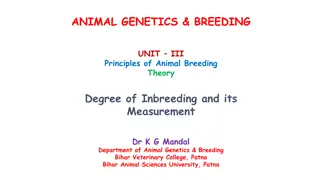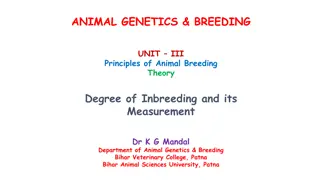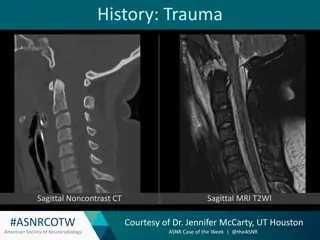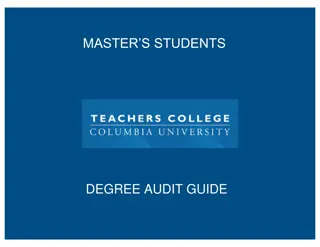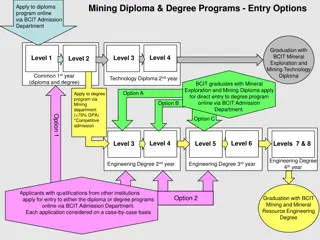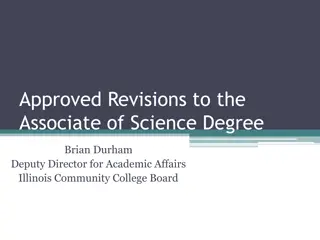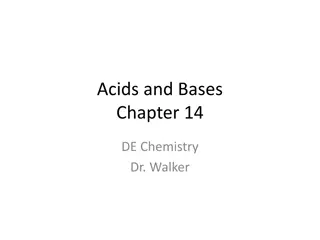The Business Transfer Degree
The Business Transfer Degree at Wenatchee Valley College is designed for students planning to pursue a bachelor's degree in business or a related major. This program offers a direct transfer agreement with various universities in Washington State, preparing students for transfer as juniors with 90 c
0 views • 24 slides
Explore the Two-Year Master's Degree in International Relations Virtual Fair 2024
Join the Master's Degree in International Relations Virtual Fair 2024 presented by the Department of Political and Social Sciences at the University of Bologna. This program offers a comprehensive two-year curriculum covering International Affairs, European Affairs, and Crime, Justice, and Security.
2 views • 13 slides
Why You Should Consider Getting Your Master's Degree in the USA
International students often choose to study for a Master's degree in the USA due to its top-notch academic programs and leading colleges. With over half of the top 100 colleges in the world located in the USA, students can choose their preferred disciplines and customize their degree plans.
9 views • 2 slides
PDF Is MMS degree worth it
In India, a highly desirable postgraduate management degree is the Master of Management Studies (MMS). It typically lasts two years and covers a range of business management course topics. The worth of obtaining an MMS degree varies based on the individual goals and aspirations of the student as wel
0 views • 2 slides
Transformation of Degree: A Lesson in English Grammar
In the lesson about Changing of Degree, students will learn how to transform superlative, comparative, and positive degrees in English grammar. The teacher will cover rules and examples for converting superlative degree to positive degree, comparative degree to positive degree, and more. The learnin
1 views • 22 slides
Understanding Degree of Inbreeding in Animal Genetics and Breeding
Degree of inbreeding refers to the extent to which an individual carries genes identical by descent. This concept is crucial in animal breeding as it affects genetic diversity and homozygosity in offspring. The coefficient of inbreeding is used to measure the level of inbreeding, with higher values
1 views • 30 slides
Understanding Degrees of Comparison in English Grammar
Degrees of comparison in English grammar refer to the different forms of adjectives and adverbs used to indicate the level of comparison between different qualities. This includes the positive degree for basic descriptions, the comparative degree for comparing two things, and the superlative degree
0 views • 17 slides
Clark College Degree Options and Worksheets
Clark College offers a variety of transferable and non-transferable degrees. The most common transfer degree pursued by Running Start students is the AA/DTA or general transfer degree. Students can find degree worksheets on the college's website to plan their education effectively. Visit the Running
1 views • 4 slides
Theories of Electrolytic Dissociation and Ionization in Physical Chemistry
The theories of electrolytic dissociation by Adil Hamid and Arrhenius explain how electrolytes dissociate into ions in solution, leading to electrical conductivity. This process involves the migration of cations and anions towards opposite electrodes, affecting the conductivity of the electrolyte. T
1 views • 51 slides
Understanding Degree of Inbreeding and its Measurement in Animal Genetics and Breeding
Degree of inbreeding in animals is the extent to which genes are identical by descent within an individual. The coefficient of inbreeding, denoted by F, measures this degree and represents the increase in homozygosity in offspring from closely related matings. Two sources of homozygosity are genes a
0 views • 15 slides
Understanding Your Degree Audit for Academic Success
Your degree audit is essential for tracking your progress towards graduation. It outlines your liberal arts core, major, and minor requirements, along with completed and outstanding courses. Learn how to request and interpret your audit, manage transfer credits, and address errors. Keep an eye on ch
1 views • 7 slides
Understanding Exam Boards and Degree Classifications
Exam boards play a crucial role in reviewing students' results, making decisions about their degrees, and determining degree classifications. The process involves marking, moderation, and external examining to ensure fairness and consistency in assessment. Before the final exam board, a moderation a
1 views • 16 slides
Get an online BBA degree from Skyeducation.co.in and take your career to the nex
Get an online BBA degree from Skyeducation.co.in and take your career to the next level. Our online BBA degree program is designed to provide you with the knowledge and skills necessary to succeed in the business world. Visit our site for more info.
3 views • 1 slides
Understanding Polynomial Degrees and Special Names
The degree of a polynomial is determined by its highest exponent, with specific names for each degree level. From the basic constant to the nth degree polynomial, this guide showcases the different degrees and their characteristics, helping you grasp the concept of polynomial functions easily.
0 views • 18 slides
Understanding Polynomials: Types, Degrees, and Zeroes
Polynomial expressions consist of terms with non-zero coefficients. They can have any number of terms and different degrees. Linear polynomials have a degree of one, quadratic polynomials have a degree of two, and cubic polynomials have a degree of three. Zeroes of a polynomial are the values of the
0 views • 17 slides
Understanding Buffer Solutions and pH Indicators
Buffer solutions resist changes in pH upon the addition of acids or bases, maintaining a stable pH level. They consist of a weak acid and its conjugate base or a weak base and its conjugate acid. pH indicators are weak acids or bases that exhibit color changes based on their degree of dissociation a
0 views • 21 slides
Understanding Atlanto-Occipital Dissociation: A Neuroradiology Case Study
Atlanto-Occipital Dissociation (AOD) is a severe injury resulting from high-velocity trauma, with a high mortality rate. This case study from the American Society of Neuroradiology explores the mechanisms, imaging findings, and differential diagnosis of AOD, emphasizing the importance of prompt reco
0 views • 4 slides
Understanding Decision Trees in Program Level Creation
Exploring the decision tree for creating program levels for undergraduate and graduate students based on various scenarios such as awarding degrees, beginning new programs, continuing education, and more. The tree outlines the steps taken when students return for a second degree, certificate, dual d
0 views • 4 slides
New Fourth Degree Official Dress Uniform Information
Explore the details of the new Fourth Degree official dress uniform, including the navy blue blazer, gray trousers, necktie, and black beret with a metal badge. The attire is tailored in Italy with high-quality materials, and each component serves a specific purpose. Orders are to be placed through
0 views • 15 slides
Understanding Homicide: Types and Examples
Homicide is the killing of one human being by another, which can be criminal, noncriminal, or negligent. It may involve deliberate intent, malice, premeditation, and different degrees of murder like first and second degree. Examples include cases of first degree murder, second degree murder, and fel
0 views • 27 slides
Wolves Hockey Summer Challenge - 212 Degree Award Program
Engage in the Wolves Hockey Summer Challenge to earn the prestigious 212 Degree Award by elevating your game one degree at a time. Participate in stickhandling, shooting, and dryland activities to accumulate points towards exciting rewards. Take part in the 10,000 Shot Club and see your name on the
0 views • 9 slides
Master's Degree Audit Guide for Students
Accessing and creating a degree audit is crucial for students pursuing a master's degree. This guide provides step-by-step instructions on how to access the degree audit system, create an audit, and move courses within the program structure. Visual aids accompany each process for easy understanding.
0 views • 23 slides
Understanding Criminal Homicide and Its Classifications
Considered a crime against the person, criminal homicide encompasses various degrees including first-degree murder, second-degree murder, manslaughter, involuntary manslaughter, and negligent homicide. Each degree is characterized by specific elements such as premeditation, malice, intent, and reckl
0 views • 8 slides
BCIT Mining Diploma & Degree Programs Entry Options
Explore the entry options for BCIT's Mining Diploma and Degree programs, including pathways for graduates to transition from the diploma to the degree program. Applicants can choose between diploma or degree programs based on their goals, with competitive admission criteria in place for direct entry
0 views • 10 slides
Fourth Year CIS Induction and Degree Classification Overview
Explore key information for fourth-year CIS students, including points of contact, degree classification details, curriculum breakdown, and academic year structure. Learn about the importance of final degree classification and the unique features of the fourth year. Understand the distribution of cr
0 views • 18 slides
QUB Foundation Degree in Biological Sciences: Course Overview and Entry Requirements
The QUB Foundation Degree in Biological Sciences is a Level 5 course equivalent to the first two years of a degree program. It offers a pathway towards a BSc (Hons) and covers a range of subjects including Genetics, Molecular Biology, Ecology, and more. The course, spanning two years, provides pract
0 views • 10 slides
Study on Heating and Cooling Degree Days Analysis in Climate Data
This study focuses on analyzing Heating Degree Days (HDD) and Cooling Degree Days (CDD) based on recent climate data and program participation records. It aims to develop utility-specific HDD and CDD values, with considerations for inland and coastal regions. Tasks include weather data collection, r
0 views • 9 slides
Understanding Electrolytes and Ionic Equilibrium in Chemistry
Electrolytes play a crucial role in conducting electricity through ionization in aqueous solutions, with examples of strong and weak electrolytes explained. The concept of ionic equilibrium, degree of dissociation, and distinction between non-electrolytes are also covered in this comprehensive overv
0 views • 21 slides
Understanding Analytical Chemistry Concepts and Applications
In the realm of analytical chemistry, various methods are employed to detect acids and bases in solutions. Litmus, a natural dye, is commonly utilized for this purpose, turning red in acidic conditions and blue in basic conditions. The slides presented touch upon key concepts such as the Arrhenius d
0 views • 47 slides
Accreditation Evolution for Computing Degree Programs
Bill Mitchell, Director of Education, proposes an evolution in university degree accreditation to incorporate employability skills for graduates pursuing professional careers in computing. The accreditation process emphasizes aligning with national skills criteria, engaging employers, and recognizin
0 views • 16 slides
Dual Degree Program: Master of Science in Fishery Science and Technology
The KU-OUC Dual Degree Program offers a unique opportunity for students to earn dual degrees from Kasetsart University and Ocean University of China. This program combines expertise from various fields such as agriculture, engineering, and medicine, providing a comprehensive and diverse educational
0 views • 14 slides
Degree Works for Graduate Students: A Step-by-Step Guide
Learn how to access and utilize Degree Works for Graduate Students in this comprehensive how-to presentation. Explore steps for accessing the system, reviewing your degree audit, evaluating required classes, checking fallthrough courses, and utilizing the What-If tool. Discover how to address questi
0 views • 10 slides
Exploring the Associate Degree for Transfer Program in California
The Associate Degree for Transfer (ADT) program in California, implemented in 2011, offers a streamlined pathway for community college students to transfer to a California State University (CSU) campus with junior standing. It guarantees admission into the CSU system, priority consideration for impa
0 views • 8 slides
Understanding Degree Audit: Step-by-Step Guide
Your student degree audit is a comprehensive evaluation of your academic coursework and progress towards graduation. It consists of blocks detailing your demographics, degree requirements, developmental needs, and program-specific courses. Learn how to interpret and navigate your degree audit effect
0 views • 16 slides
Addressing Revisions to Associate of Science Degree in Illinois Community Colleges
Changes are proposed to the Associate of Science (AS) degree model in Illinois Community Colleges to better serve students in science fields. The current model lacks alignment with baccalaureate programs, creating challenges for transfer students. Modifications aim to allow for easier transfer pathw
0 views • 42 slides
Exploring Degree Apprenticeships: A Path Towards Success
Discover the benefits of degree apprenticeships as a viable alternative to traditional university education. Learn about the opportunities, advantages, and unique features of degree apprenticeships, including real job experience, degree-level qualifications, no student loans, and competitive salarie
0 views • 11 slides
Degree Apprenticeships: A Path to Earning a Degree While Gaining Work Experience
Degree Apprenticeships offer a unique opportunity to obtain a bachelor's or master's degree while gaining valuable work experience. Programs such as Digital and Technology Solutions and Diagnostic Radiographer provide real-world learning experiences in partnership with industry leaders. With no tuit
0 views • 12 slides
Understanding Polyprotic Acids and Salts in Chemistry
Exploring the concept of polyprotic acids, particularly focusing on sulfuric acid as a unique example with its dual dissociation steps. The discussion delves into the equilibrium concentrations of ions in solution, calculating pH values for different acid concentrations, and understanding the signif
0 views • 18 slides
Understanding Acids and Bases in Chemistry: Key Concepts and Terminology
This chapter delves into the fundamental concepts of acids and bases in chemistry, covering Arrhenius, Bronsted-Lowry, and Lewis definitions. It discusses conjugate acids and bases, acid dissociation, dissociation of strong and weak acids, and the differences between strong and weak acids/bases. The
0 views • 41 slides
Understanding Bond Lengths and Strengths in Chemistry
Bond lengths represent the critical distance between bonded atoms for maximum stability, while bond strengths are measured through dissociation energy and average bond energy. Methods for measuring bond lengths include X-ray diffraction and spectroscopic methods, with bond energies reflecting the st
0 views • 38 slides





